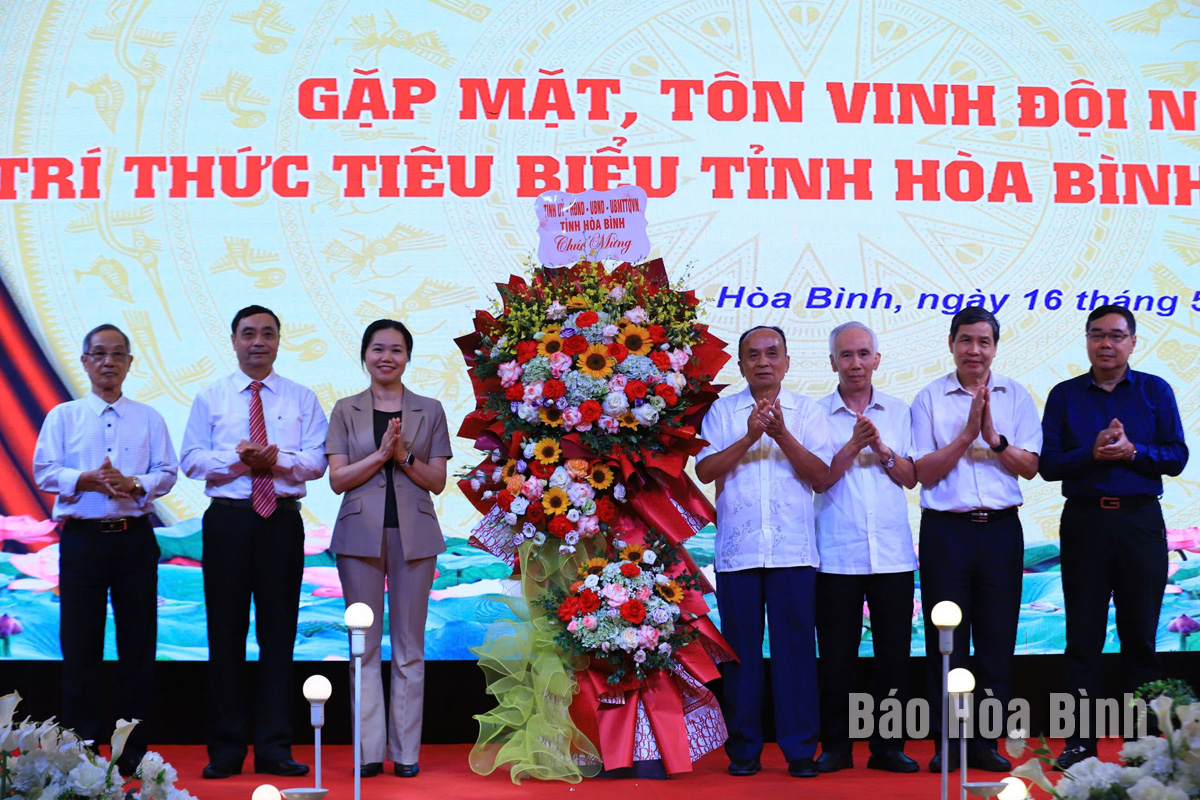
The People’s Committee of Hoa Binh province on May 16 held a conference to honour outstanding intellectuals for their contributions in 2025.
Bui Thi Minh, Permanent Deputy Secretary of the provincial Party Committee, Chairwoman of the provincial People's Council presents flowers to local intellectuals.
The event was attended by Professor Dang Vu Minh, former
Chairman of the National Assembly’s Committee for Science, Technology and
Environment, and Honorary President of the Vietnam Union of Science and
Technology Associations (VUSTA); Dr. Phan Xuan Dung, President of VUSTA; Bui
Thi Minh, Permanent Deputy Secretary of the provincial Party Committee and
Chairwoman of the provincial People’s Council; along with representatives from
VUSTA, local departments, agencies, and over 220 distinguished delegates
representing local intellectuals.
In recent years, the contingent of intellectuals of Hoa Binh have shown
remarkable proactiveness, creativity, and dedication in conducting research and
proposing solutions for local socio-economic development. They have played a pivotal
role in education, healthcare, science and technology, arts and culture,
helping to raise public awareness, develop human resources, and contribute
significantly to the province's social life, national defence, and security.
At the conference, delegates discussed several key topics, including enhancing
the role of intellectuals and science and technology in enterprises, the
implementation of the Politburo’s Resolution No. 57-NQ/TW, harnessing the
intellectual potential of retired experts in scientific consultancy and
policymaking, and promoting green, sustainable agriculture to boost Hoa Binh’s
socio-economic advancement.
In his address, Dung congratulated Hoa Binh’s intellectuals, noting that those
honoured serve as shining examples in scientific research and innovation,
making impactful contributions to both their respective fields and society at
large. He affirmed that VUSTA would continue to support and facilitate the
activities of its Hoa Binh chapter, contributing meaningfully to both provincial
and national development.
Speaking at the event, Minh extended congratulations and commendation to the
intellectuals for their valuable contributions. She emphasised that Hoa Binh
has maintained a strong tradition of unity and innovation in governance, achieving
notable success in political and socio-economic goals, particularly in
delivering on the strategic breakthroughs outlined by the 17th Provincial Party
Congress, especially in developing human resources, creating jobs, and
enhancing labour productivity.
The official underscored that these achievements reflect the concerted efforts
of the Party, administration, and people of Hoa Binh. Intellectuals, she added,
have played a crucial role in these successes through research, policy
proposals, and initiatives promoting sustainable development and preserving the
cultural identity of the Muong ethnic group while nurturing a healthy cultural
environment. Regardless of their fields, intellectuals remain a driving force
in the province’s progress.
Minh called on local intellectuals to continue fostering a spirit of
creativity, dedication, and responsibility, contributing ideas and efforts to
build a prosperous and sustainable homeland—one that harmoniously integrates
economic growth with cultural, social, scientific, technological, and
environmental development.
On this occasion, the provincial People’s Committee also launched a movement
encouraging intellectuals to actively engage in study, research, and innovation
in their professional and productive endeavours.
When requesting personal document verification and certification service at the one-stop-shop service section of Dong Tam Commune in Lac Thuy district, Nguyen Thanh Long, a resident of Dong Bong village, was both surprised and pleased with the professionalism and attitude of civil servants working there.
Hoa Binh province has harnessed its rich cultural heritage and human potential to forge the path towards sustainable development in the new era.
In Hoa Binh province, 11 traditional craft villages with more than 400 small-scaled production households have put in place a clean and green production model, establishing new standards for sustainable development. Waste collection sites and wastewater treatment facilities have been meticulously managed by local residents.
To make it easier for the residents to handle administrative procedures, Yen Bong Commune (Lac Thuy District) has identified the administrative reform as one of its key tasks. By implementing a range of synchronized solutions, the commune has seen the positive changes in the administrative reform, meeting the needs of its people.
Mai Chau district has firmly established itself as a standout destination on Vietnam’s tourism map, attracting both domestic and international visitors with its breathtaking landscapes, rich ethnic culture, and warm hospitality. However, beyond its natural and cultural charm, a secure and well-managed tourism environment has added to Mai Chau’s appeal.
As Vietnam enters a new phase of economic and administrative reform in 2025, Hoa Binh province is stepping up its efforts to streamline governance, boost economic growth, and attract investment.



